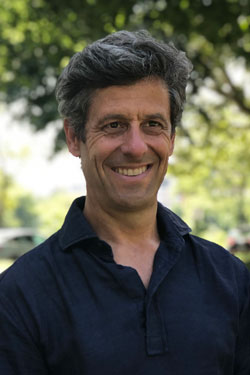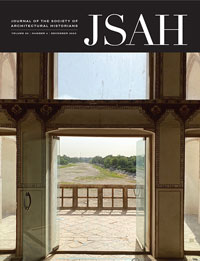-
Membership
Membership
Anyone with an interest in the history of the built environment is welcome to join the Society of Architectural Historians -
Conferences
Conferences
SAH Annual International Conferences bring members together for scholarly exchange and networking -
Publications
Publications
Through print and digital publications, SAH documents the history of the built environment and disseminates scholarship -
Programs
Programs
SAH promotes meaningful engagement with the history of the built environment through its programsMember Programs
-
Jobs & Opportunities
Jobs & Opportunities
SAH provides resources, fellowships, and grants to help further your career and professional life -
Support
Support
We invite you to support the educational mission of SAH by making a gift, becoming a member, or volunteering -
About
About
SAH promotes the study, interpretation, and conservation of the built environment worldwide for the benefit of all
Announcing the New SAH Digital Advisory Committee
May 3, 2021
by
SAH News
The Society of Architectural Historians is pleased to announce the formation of the new SAH Digital Advisory Committee, created to encourage greater connection between SAH's digital projects including JSAH Online, SAH Archipedia, SAHARA, and SAH Commons.
The SAH Digital Advisory Committee will work toward the following goals:

 Gabrielle Esperdy is an architectural and urban historian whose work examines intersections of modernism and consumerism in metropolitan landscapes. Her most recent book, American Autopia, studies how architectural and urban discourse absorbed the ideals and concerns of the automobile and the territories of the car in the middle of the 20th century. Her first book, Modernizing Main Street, documented efforts to revitalize retail corridors during the Great Depression. Esperdy has published widely on topics ranging from feminism and architecture to queer theory and urbanism, as well as intersections of technology, historiography, and methodology. She is currently a project researcher for Ed Ruscha’s Streets of Los Angeles, a digital humanities initiative of the Getty Research Institute, for which she is developing a morphology of 20th century commercial buildings and spaces. Esperdy is the founding editor of SAH Archipedia, an open-access peer-reviewed online encyclopedia of the history of the built environment; she is also associate editor of the Buildings of the United States book series and author of histories of 100 significant buildings and structures in New Jersey (forthcoming in Archipedia). A columnist for Places, Gabrielle has appeared on numerous broadcast and web series, including Ten that Changed America on PBS. She was a public scholar in the humanities for the state of New Jersey from 2017 to 2020. Esperdy’s work has been supported by the National Endowment for the Humanities, the Graham Foundation, the New Jersey Historical Commission, and the Beverly Willis Architecture Foundation, among others. She was educated at Smith College and the Graduate Center of the City University of New York and is currently Professor of Architecture in the Hillier College of the New Jersey Institute of Technology, where she has taught since 2001.
Gabrielle Esperdy is an architectural and urban historian whose work examines intersections of modernism and consumerism in metropolitan landscapes. Her most recent book, American Autopia, studies how architectural and urban discourse absorbed the ideals and concerns of the automobile and the territories of the car in the middle of the 20th century. Her first book, Modernizing Main Street, documented efforts to revitalize retail corridors during the Great Depression. Esperdy has published widely on topics ranging from feminism and architecture to queer theory and urbanism, as well as intersections of technology, historiography, and methodology. She is currently a project researcher for Ed Ruscha’s Streets of Los Angeles, a digital humanities initiative of the Getty Research Institute, for which she is developing a morphology of 20th century commercial buildings and spaces. Esperdy is the founding editor of SAH Archipedia, an open-access peer-reviewed online encyclopedia of the history of the built environment; she is also associate editor of the Buildings of the United States book series and author of histories of 100 significant buildings and structures in New Jersey (forthcoming in Archipedia). A columnist for Places, Gabrielle has appeared on numerous broadcast and web series, including Ten that Changed America on PBS. She was a public scholar in the humanities for the state of New Jersey from 2017 to 2020. Esperdy’s work has been supported by the National Endowment for the Humanities, the Graham Foundation, the New Jersey Historical Commission, and the Beverly Willis Architecture Foundation, among others. She was educated at Smith College and the Graduate Center of the City University of New York and is currently Professor of Architecture in the Hillier College of the New Jersey Institute of Technology, where she has taught since 2001.


.jpg?sfvrsn=6b63259b_0&MaxWidth=200&MaxHeight=&ScaleUp=false&Quality=High&Method=ResizeFitToAreaArguments&Signature=EBED15E08DA5BB9CD51D0259A00E7018)




- Sharing and growth of existing and potential resources
- Expanding connections and sharing resources among these publications and with other potential collaborators
- Identifying and developing unexplored areas of interoperability, both at the conceptual and platform levels
- Identifying and developing new audiences and contributors
Jay Cephas

Jay Cephas is an assistant professor of architecture and urbanism at Northeastern University where he conducts research that explores the relationships between labor, technology, and identity in the history and theory of the built environment. Jay is also the founding director of Studio Plat, a geospatial research and development practice that examines the past, present, and future of cities. In 2020, Jay was awarded a Graham Foundation grant to support the Black Architects Archive, an interactive web-based repository of under-represented architects from across 200 years of history. Jay has previously taught at University of Michigan, Cranbrook Academy of Art, Harvard University, and the University of Detroit Mercy. Jay also served as a 2019 W.E.B. Du Bois Fellow at the University of Massachusetts Amherst.
Gabrielle Esperdy (Co-Chair)
 Gabrielle Esperdy is an architectural and urban historian whose work examines intersections of modernism and consumerism in metropolitan landscapes. Her most recent book, American Autopia, studies how architectural and urban discourse absorbed the ideals and concerns of the automobile and the territories of the car in the middle of the 20th century. Her first book, Modernizing Main Street, documented efforts to revitalize retail corridors during the Great Depression. Esperdy has published widely on topics ranging from feminism and architecture to queer theory and urbanism, as well as intersections of technology, historiography, and methodology. She is currently a project researcher for Ed Ruscha’s Streets of Los Angeles, a digital humanities initiative of the Getty Research Institute, for which she is developing a morphology of 20th century commercial buildings and spaces. Esperdy is the founding editor of SAH Archipedia, an open-access peer-reviewed online encyclopedia of the history of the built environment; she is also associate editor of the Buildings of the United States book series and author of histories of 100 significant buildings and structures in New Jersey (forthcoming in Archipedia). A columnist for Places, Gabrielle has appeared on numerous broadcast and web series, including Ten that Changed America on PBS. She was a public scholar in the humanities for the state of New Jersey from 2017 to 2020. Esperdy’s work has been supported by the National Endowment for the Humanities, the Graham Foundation, the New Jersey Historical Commission, and the Beverly Willis Architecture Foundation, among others. She was educated at Smith College and the Graduate Center of the City University of New York and is currently Professor of Architecture in the Hillier College of the New Jersey Institute of Technology, where she has taught since 2001.
Gabrielle Esperdy is an architectural and urban historian whose work examines intersections of modernism and consumerism in metropolitan landscapes. Her most recent book, American Autopia, studies how architectural and urban discourse absorbed the ideals and concerns of the automobile and the territories of the car in the middle of the 20th century. Her first book, Modernizing Main Street, documented efforts to revitalize retail corridors during the Great Depression. Esperdy has published widely on topics ranging from feminism and architecture to queer theory and urbanism, as well as intersections of technology, historiography, and methodology. She is currently a project researcher for Ed Ruscha’s Streets of Los Angeles, a digital humanities initiative of the Getty Research Institute, for which she is developing a morphology of 20th century commercial buildings and spaces. Esperdy is the founding editor of SAH Archipedia, an open-access peer-reviewed online encyclopedia of the history of the built environment; she is also associate editor of the Buildings of the United States book series and author of histories of 100 significant buildings and structures in New Jersey (forthcoming in Archipedia). A columnist for Places, Gabrielle has appeared on numerous broadcast and web series, including Ten that Changed America on PBS. She was a public scholar in the humanities for the state of New Jersey from 2017 to 2020. Esperdy’s work has been supported by the National Endowment for the Humanities, the Graham Foundation, the New Jersey Historical Commission, and the Beverly Willis Architecture Foundation, among others. She was educated at Smith College and the Graduate Center of the City University of New York and is currently Professor of Architecture in the Hillier College of the New Jersey Institute of Technology, where she has taught since 2001.
Dianne Harris

Dianne Harris is a senior program officer in the Higher Learning program at The Andrew W. Mellon Foundation where she has worked since 2017. Prior to joining the Foundation, she served as dean of the College of Humanities at the University of Utah, and as director of the Illinois Program for Research in the Humanities at the University of Illinois at Urbana-Champaign where she was also a member of the faculty for 19 years with appointments across multiple departments. Dr. Harris is an architectural and urban historian with expertise that ranges from 18th-century Italy to the postwar United States with a particular focus on race and space. She is the author of Little White Houses: How the Postwar Home Constructed Race in America (2013) and is author or editor of five additional volumes and many scholarly essays and articles. With a long track-record of humanities advocacy, Dr. Harris has served on numerous boards including the Society of Architectural Historians for whom she is also a past president, the Buell Center for the Study of American Architecture, the Utah Humanities Council, and her ongoing board service for the National Humanities Alliance.
Mark Hinchman

Mark Hinchman is professor of interior design in the College of Architecture at the University of Nebraska. He teaches architecture and design history courses, as well as interior design studios. His research areas include African domestic architecture, modernism in South East Asia, and design history. From 2013-2015 he taught in Kuala Lumpur, Malaysia.
He studied architecture at the University of Notre Dame and was in one of Colin Rowe’s last urban design studios at Cornell. He was employed by Phillipp Holzmann, AG in Frankfurt, and Skidmore, Owings and Merrill and the Environments Group (now Perkins and Will) in Chicago. As a registered architect in the state of Illinois, he worked doing corporate interiors in the 1980s and 1990s.
He completed his doctoral studies in art history at the University of Chicago. His dissertation looked at the 18th century architecture and urbanism of the West African island of Gorée, Sénégal. Research for it was funded with a Fulbright grant. He later published a monograph based on his doctoral work, Portrait of an Island, which was also the subject of his JSAH article.
He has written three interior design reference books, The Dictionary of Interior Design, History of Furniture, and Interior Design Masters. He writes widely on interiors, design, and vernacular architecture, and has published in The Journal of Interior Design, The Société Voltaire, and Interior Design. His funding sources include the Camargo Foundation, the Getty Research Institute, the Graham Foundation, and the NEH. In 2020 he was named co-editor of SAHARA.
Kristin Love Huffman
.jpg?sfvrsn=6b63259b_0&MaxWidth=200&MaxHeight=&ScaleUp=false&Quality=High&Method=ResizeFitToAreaArguments&Signature=EBED15E08DA5BB9CD51D0259A00E7018)
Kristin Love Huffman, Lecturing Fellow at Duke University, is an art and architectural historian of Early Modern Italy as well as a leading figure in the field of digital art history. Her current research focuses on the uses, configurations, and deliberate re-ordering of architectural spaces and urban systems in Venice.
She serves as associate director of Visualizing Venice/Visualizing Cities, an international collaborative that visualizes change over time in urban spaces, and is a leader of the Digital Art History and Visual Culture Research Lab (formerly Wired!) at Duke. For the lab, she has developed curricular strategies, pedagogical research initiatives, and courses that integrate digital methods with art historical content.
As part of the Visualizing Venice initiative, she has curated multiple innovative, interactive exhibitions at Duke and in Venice. These include a forthcoming installation at the Museo Correr, Venice, centered on Jacopo de’ Barbari’s View and the original wooden matrices used to print the iconic image in 1500.
She has been awarded grants by the National Endowment for the Humanities, the Samuel H. Kress Foundation, and the Gladys Krieble Delmas Foundation. Additional awards include publication subventions from the Renaissance Society of America and the Furthermore Foundation for her forthcoming, edited volume with Duke University Press, A Portrait of Venice: Jacopo de’ Barbari’s View.
Recent publications of her digital humanities scholarship include: “Jacopo de’ Barbari’s View of Venice (1500): ‘Image Vehicles’ and ‘Pathways of Culture’ Past and Present,” Mediterranea (2019), and “San Geminiano: ‘a Ruby among Pearls,’” JSAH (2020).
David Karmon

David Karmon is Professor of History of Art and Architecture and Head of the Architectural Studies program at Holy Cross. The author of Architecture and the Senses in the Italian Renaissance: The Varieties of Architectural Experience (Cambridge University Press, 2021) and The Ruin of the Eternal City: Antiquity and Preservation in Renaissance Rome (Oxford University Press, 2011), his writings on architecture, urbanism, and the history of archaeology have appeared in numerous journals, anthologies, and exhibition catalogues. He has received numerous accolades for his work, including the Lily Auchincloss / Andrew W. Mellon Foundation Post-Doctoral Rome Prize in Renaissance and Early Modern Studies at the American Academy in Rome, as well as fellowships from the Institute of Advanced Studies at Princeton, the National Endowment for the Humanities, the Newberry Library, the Clark Art Institute, the Canadian Centre for Architecture, and the Bogliasco Foundation. As Book Review Editor for Europe, Asia, and Africa before 1750 (2018-20), and Chief Editor at the Journal of the Society of Architectural Historians (2021-23), his expertise extends across many areas of the global built environment. He is currently working on a new book on Renaissance architecture and natural history.
Jeffrey E. Klee

Jeffrey E. Klee is the Vice-President and Senior Director of Architecture for the Classical American Homes Preservation Trust. For the previous 16 years, he was an architectural historian for the Colonial Williamsburg Foundation, where he oversaw the creation of a wide-ranging research database and a digital image archive comprising over 100,000 records. His scholarship focuses on American architecture from the colonial period to the Civil War. His most recent articles include an essay on the philosophy of architectural history in the journal Buildings and Landscapes and a popular piece on Robert Carter III’s reading closet for his house in Williamsburg.
Jeff has been involved in SAH digital initiatives since 2004. He was part of the original steering committee for SAHARA and for many years was its co-editor. He currently serves on the editorial committee for the Buildings of the United States series, through which he has supported the development of its digital edition in SAH Archipedia. He has degrees from Yale and the University of Delaware, where he completed his dissertation on the buildings of Boston’s Beacon Hill.
Jackie Spafford (Co-Chair)

Jackie Spafford is the image resources curator in the History of Art & Architecture Department, University of California, Santa Barbara. Jackie is from Toronto, and received her MA from the University of Toronto. She has been in her position at UCSB since 1998, and during that time her role and responsibilities have changed immensely. She began with the task of transitioning both the collection and instruction from analogue to digital media, which has led to digital initiatives and collaborations at UCSB, as well as UC-wide and with other institutions and professional organizations. She is currently working as co-PI on an NEH grant that builds on the Color Film Emergency Project mission of addressing at-risk 35mm slide collections of the built environment. She is the co-editor of SAHARA, the Society of Architectural Historians Architectural Resources Archive, and serves as an ex-officio SAH board member.
Danielle Willkens

Danielle Willkens Assoc. AIA, FRSA, LEED AP BD+C is an assistant professor at Georgia Institute of Technology’s School of Architecture where she teaches architectural history, design studios, and a research seminar focused on race, space, and architecture in the United States. Willkens is a practicing designer, researcher, and FAA Certified Remote Pilot who is interested in bringing architectural engagement to diverse audiences through interactive projects. Her experiences in practice and research include design/build projects, public installations, and on-site investigations as well as extensive archival work in several countries. As an avid photographer and illustrator, her work has been recognized in the American Institute of Architects National Photography Competition and she has contributed graphics to several exhibitions and publications. She was the 2015 recipient of the Society of Architectural Historians' H. Allen Brooks Travelling Fellowship and her research into transatlantic design network has been supported by the Sir John Soane’s Museum Foundation, the International Center for Jefferson Studies, and an American Philosophical Society Franklin Research Grant. She is currently part of a multidisciplinary team working to document and digitally reconstruct the area of significance related to “Bloody Sunday” in Selma, Alabama, and the March to Montgomery. Her team, with members from Auburn University, was awarded a 2018 African American Civil Rights Grant to create a Historic Structures Report of the Edmund Pettus Bridge. She is on the board of trustees for the Atlanta Preservation Center, and the Education Committee of the Southeast Chapter for the Institute of Classical Architecture and Art.


